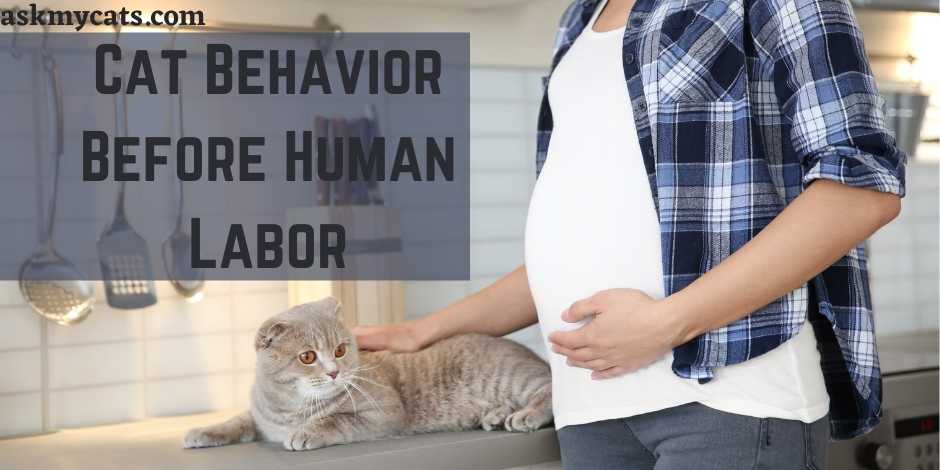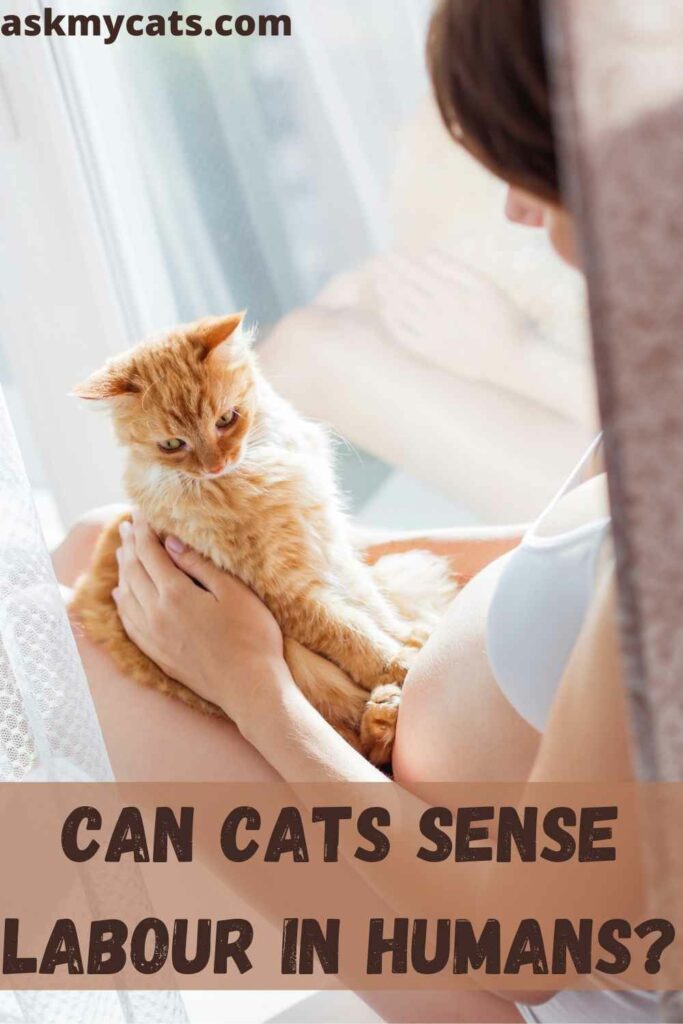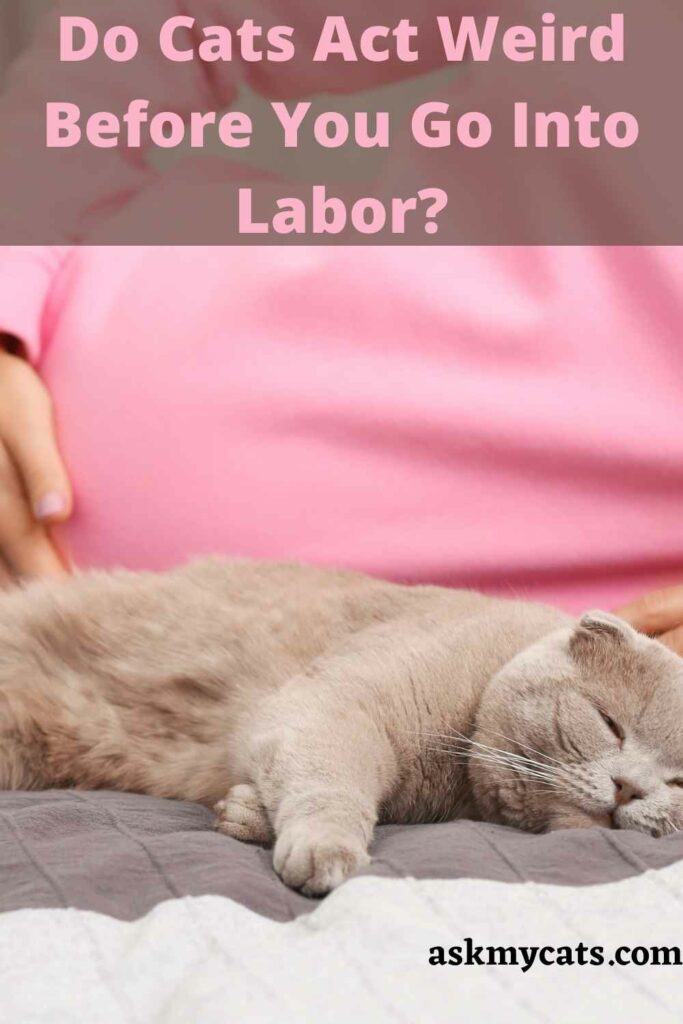If you talk to a cat lover, you’ll almost certainly hear about how wonderful their pet is. If you talk to a pregnant cat owner, you could hear anecdotes of their cat becoming more protective, affectionate, or otherwise demonstrating that they are aware that their human is expecting a child. Perhaps this is a good description of your circumstance.
There’s no denying that cats are keen observers of their surroundings – possibly much more so than most humans realize. So can cats sense that you are going into labor and how do they respond to it?
Yes, most people believe that cats can sense that a human is going into labor and will try to tell you by purring or meowing.
This article will talk about can cats sense when a person is going into labor and how do they respond to it.


Give Your Cat the Perfect Day
Get the Free Ebook!
Can Cats Sense Labor In Humans?
Yes, most cats can sense labor in humans.

Few things are sweeter than your cat nuzzling your baby bump, but what does it signify when they do something unusual for them, especially if your due date isn’t far away?
Is it possible that your four-legged friend is attempting to communicate with you?
Is your cat aware that you’re about to give birth? It’s possible that this isn’t the first time they’ve tried to warn you about something.
Yes, according to researchers, your cat can sense when its human parent is about to give birth.
Many believe that cats can foretell earthquakes, hurricanes, sickness, and even when a lady is ready to give birth.
According to Erin Askeland, a pet behaviorist, there isn’t much scientific evidence to support how cats react to their owners’ pregnancy and delivery.
However, “There are many statements from women and surrounding family members that support these claims, as well as the knowledge that cats can detect certain things in the body like insulin levels, oncoming seizures, and even cancer; so the claim that they can also detect shifts in a woman’s body during pregnancy isn’t far-fetched, particularly over the nine months of pregnancy,” she writes.
If you’re like most cat owners, you’ve definitely witnessed your feline companion demonstrate exceptional insight. Cats sometimes appear to have a sixth sense, similar to how they pace before a storm.
According to an Associated Press-Petside.com poll, 72 percent of cat owners have received weather warnings from their cats, and 47 percent have received bad news from their pets, according to NBC News.
These owners claimed a variety of methods in which their cat communicated with them, such as becoming too energetic or meowing incessantly.
Also, check out about I’m pregnant and my cat follows me everywhere
Do Cats Know When A Baby Is Coming?
Yes, cats do know when a baby is coming and act weird before you go into labor. Some might show behavior like: –

1. Sniffing You
Keep an eye out for your cat being extra sniffy as your due date approaches, especially around the crotch area!
According to Animal Planet, “a cat’s sense of smell is around 14 times keener than that of their two-legged companions,” according to the Alabama Cooperative Extension System (ACES).
“Many cat experts think it’s a lot better than that.”
Sure, your vaginal aroma changes when you’re pregnant, but it appears that much more than a novel smell piqued these cats’ curiosity in this case.
“Cats can detect changes in their owner’s body as she goes into labor – these odors are caused by hormones related with pregnancy and childbirth, such as oxytocin, estrogen, and progesterone,” experts explain. “They might even be able to detect the fragrance of the placenta.”
2. Peeing Where They Shouldn’t
If your generally well-behaved cat starts peeing on the walls or the furniture, you might be on your way to the delivery room soon: “The day I went into labor, I went to the toilet, and my cat followed me in and peed on the floor right in front of me,” one pregnant mother explained.
House-trained cats, according to experts, can urinate where they shouldn’t when they’re overexcited or afraid, and labor elicits both of those emotions.
Many people agree that your cat’s behavior can shift. Some cats may become apprehensive or anxious as a result of their owner’s stress, exhibiting behaviors including pacing, vocalizing, maintaining a safe distance, or hiding. Alternatively, peeing.
Also, check out can i sleep with my cat while pregnant
3. Over Vocalising
Cats may not be able to communicate verbally, but their meows and whines can convey a lot of information, including the fact that your kid is on the way.
“I was 39 weeks and 2 days pregnant at the time, and I was sitting in my rocking chair when she started meowing and weeping at me; I wasn’t feeling well that night,” explained an expecting mother.
Her cat was right on the money because she went into labor the next morning. However, it’s possible that your cat has picked up on the fact that you’re stressed or worried.
4. Ignoring You
If your normally affectionate cat becomes aloof, it could be a sign that your kid is on the way (and about to replace him).
“Right now, my cat is ignoring me. I think I’m in early labor since she won’t give me a cuddle “a woman stated.
Cats may detect a shift in their owner’s stress level by tone and intonation, as well as how they move, which is likely to vary throughout the pregnancy and labor, so if your cat is giving you some space, it could be a sign of a change. Experts say it all depends on the cat.
Also, check out whether is it safe to breathing in cat litter when pregnant
Do Cats Get Clingy Before You Go Into Labor?
Yes, cats can get clingy before you go into labor.
If your cat seems to be following you around more than normal, you may be on the verge of giving birth.
“My cat was extremely clingy and protective the night before my induction. He would not leave my side for anything, and if I went somewhere he couldn’t go, he would cry “In an interview, a mother, stated.
“I awoke at 1:30 a.m. with intense but erratic contractions. Animals, I believe, can detect these things “she stated This, according to experts, isn’t out of the possibility. Because your cat has most likely spotted you acting strangely, they may become glued to your side, maintain contact with you, or try to console you.
You might like to read about my cat keeps laying on my stomach am i pregnant
Frequently Asked Questions
Is there a history of cats sensing labor?
Cats have long relied on their remarkable sense of smell to help them navigate the world. In reality, one of the oldest senses is the sense of smell. Many thousands of years ago, when cats and their ancestors lived in the wild, cats’ noses and sense of smell were especially important. For almost everything, their ancestors relied on their sense of smell. We can infer that a cat utilizing its nose to detect labor has had this skill for thousands of years. Cats are extremely sensitive to their human owners, sensing emotions, illness, and much more. Many cat parents have stories of their cats rubbing their faces against their bellies all day until they started having contractions.
What should I do to prepare my cat for the baby’s arrival?
Reduce the amount of care you offer your cat gradually, especially if this is your first child. You’ll have less time for your cat at first because the new infant will take up a lot of your time and energy. Unfortunately, some cats are adversely affected by this adjustment. So, if you regularly lavish a lot of care on your cat, start reducing it in preparation for the baby.
Can a cat hear a fetal heartbeat?
Because of their incredible sense of smell, cats and dogs are apt to detect hormonal changes that occur during pregnancy. Because of their keen hearing, they are likely to hear the baby’s heartbeat in the later stages of pregnancy.
Final Words
Cats are attentive and have keen hearing and smell senses, so there’s a decent chance your feline pal will detect labor — or at least notice that something isn’t quite right.
When introduced appropriately, babies and cats can make a lovely pair. Whether or not your cat’s behavior changes throughout your pregnancy, there will be significant changes after the baby arrives. Don’t be surprised if your toddler and cat quickly become best friends.
If you have any questions, ask us in the comments section.
